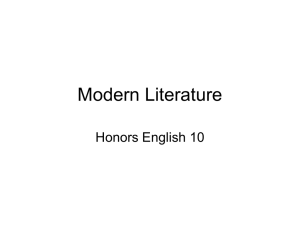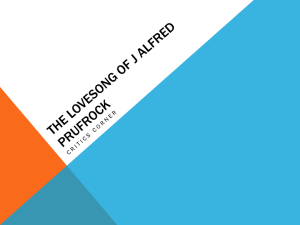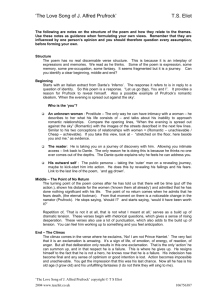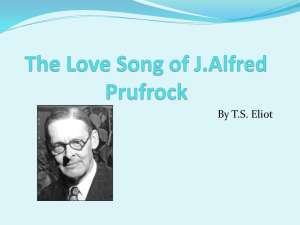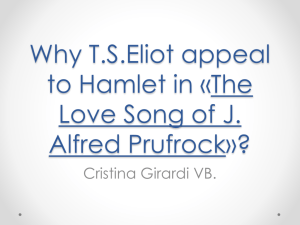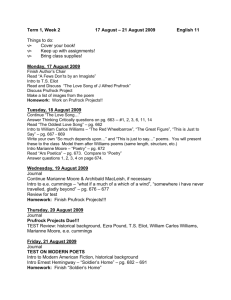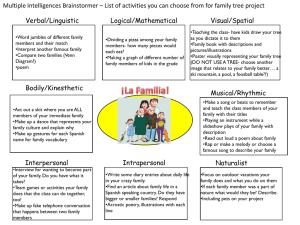FPO
advertisement
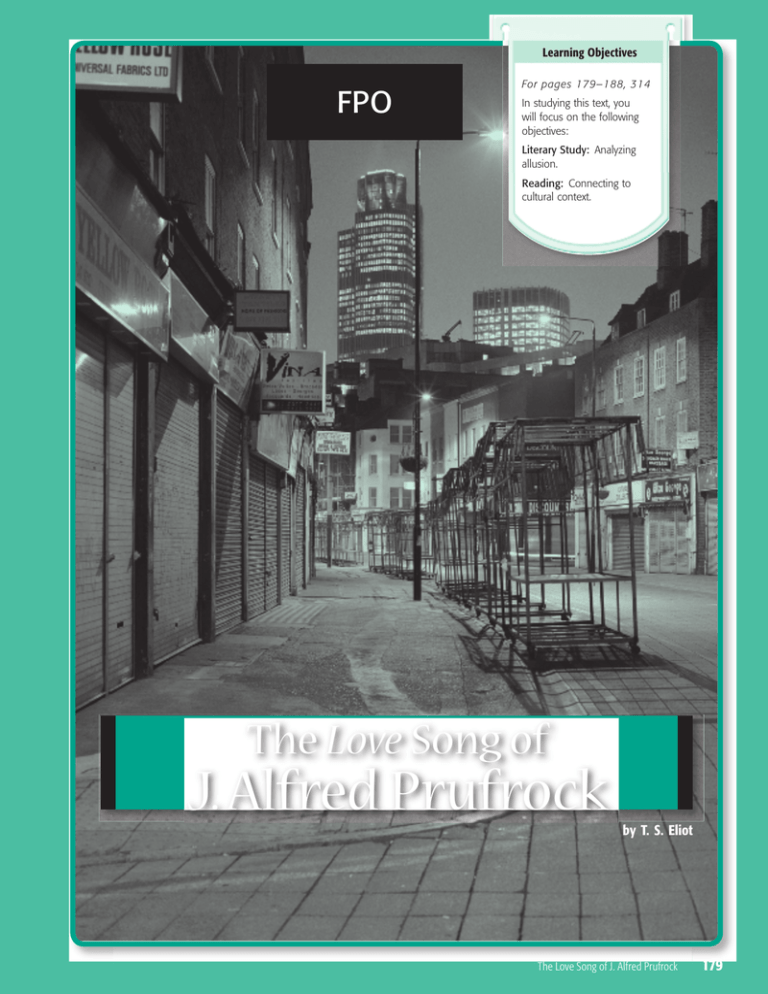
Learning Objectives FPO For pages 179–188, 314 In studying this text, you will focus on the following objectives: Literary Study: Analyzing allusion. Reading: Connecting to cultural context. The Love Song of J. Alfred Prufrock by T. S. Eliot The Love Song of J. Alfred Prufrock 179 Before You Read The Love Song of J. Alfred Prufrock Connect to the Poem Respond to each of the following questions on the lines below them. • This poem was written in an era in which poets were beginning to reject conventional poetic forms. What form or forms do you expect the poem to take? _________________________________________________________________________________________________ • The title includes the phrase “Love Song.” What do you expect from a poem that includes these words in the title? _________________________________________________________________________________________________ • Think about the name of the poem’s protagonist: J. Alfred Prufrock. What do you expect of a person with this name? _________________________________________________________________________________________________ Build Background • T. S. Eliot was one of the twentieth century’s most influential writers. His experiments in language and forms changed literary tastes. • Eliot began his career as rural ways of life were giving way to rapid urbanization, or the growth of cities. • In many cities, factories dominated neighborhoods crowded with teeming tenement buildings. • Eliot’s poetry examined the feelings of loneliness, alienation, and frustration that many people felt living in impersonal modern cities. Now, without looking at what you just read, write down two facts that you remember from the Build Background notes. ____________________________________________________________________________________________________ ____________________________________________________________________________________________________ Set Purposes for Reading In this poem, T. S. Eliot presents a strange, dreamlike journey through a modern city. Read to find out in what ways he rejects some of the conventions of traditional poetry. 180 Literary Element Allusion In a work of literature, an allusion is an indirect reference to a character, a place, or a situation from history, art, music, or literature. Authors often use allusions to deepen the meaning they are trying to bring across in their work. Think about the following situations and how you would experience them. Then, on the lines below, identify an allusion you might make if you were to write about your reaction to the experience. Your allusion can be from literature, movies, television, popular music, and any other cultural form with which you are familiar. • You are at a party and you don’t know any other guest. _________________________________________________________________________________________________ • You just led your team to victory in an athletic or academic contest. _________________________________________________________________________________________________ Reading Strategy Connect to Cultural Context A piece of writing is more meaningful when it is placed within its cultural context , or the society in which the writer lived, the technologies that surrounded the writer, and the historical forces that influenced the writer. Meaning is also enhanced by recognizing references to cultural contexts within the piece of writing itself. As you read, use the chart like the one below to note and identify the cultural context of passages in the poem and to evaluate their importance to your interpretation of the poem. A sample has been done for you. Passage Cultural Context “When the evening is spread out Modern technology (surgery) against the sky/Like a patient etherised upon a table.” Interpretation This reference makes nature itself (the evening sky) seem diseased. Vocabulary Vocabulary Antonyms Antonyms are words that mean the opposite or nearly the opposite. Recognizing that a word is an antonym of another word can help build your vocabulary and understanding of words. Review the vocabulary words on the right. Using these definitions, match each bold-faced word below with its antonym from the list next to it Write the letter of the antonym on the line next to the vocabulary word. 1. insidious _____ a. focus 2. presume _____ b. obvious 3. digress _____ c. know 4. malinger _____ d. disobedient 5. deferential _____ e. persevere insidious (in siʼ dē əs) adj. operating in a not easily observed manner, usually with a negative effect presume (pri zoomʼ) v. to expect something without justification; to take for granted digress (dı̄ gresʼ) v. to depart from the main subject; to ramble malinger (mə lingʼ gər) v. pretends incapacity or illness to avoid work deferential (defʼ ə renʼ shəl) adj. yielding to someone else’s opinions or wishes The Love Song of J. Alfred Prufrock 181 The Love Song of J. Alfred Prufrock S’io credessi che mia resposta fosse a persona che mai tornasse al mondo, questa fiamma staria senza più scosse. Ma per ciò che giammai di questo fondo non tornò vivo alcun, s’i’odo il vero, senza tema d’infamia ti respondo. Read and Discuss The first stanza is an epigraph from Dante’s Inferno, a medieval Italian poem describing a journey through hell. Here, a condemned spirit confesses his sins because he believes what he says will not be revealed to those still on Earth. With a partner, discuss why Eliot begins the poem this way. What does his inclusion of the epigraph tell about the people he expected to be reading the poem at the time it was written? Write your answer on the lines below. ____________________________ ____________________________ 5 10 Let us go then, you and I, When the evening is spread out against the sky Like a patient etherised1 upon a table; Let us go, through certain half-deserted streets, The muttering retreats Of restless nights in one-night cheap hotels And sawdust restaurants with oyster-shells: Streets that follow like a tedious2 argument Of insidious intent To lead you to an overwhelming question… Oh, do not ask, ‘What is it?’ Let us go and make our visit. In the room the women come and go Talking of Michelangelo.3 ____________________________ ____________________________ ____________________________ ____________________________ Vocabulary insidious (in siʼ dē əs) adj. operating in a not easily observed manner, usually with a negative effect 1. Etherised (etherized) (eʼ thə rı̄zdʼ) means “anesthetized with ether, as before an operation”; in other words, “made insensitive to pain.” 2. Tedious means “tiresome because of length” or “boring.” 3. Michelangelo Buonarroti (mı̄ʼ kəl anʼ jə lō bwô nä rôʼ tē) (1475–1564) was a gifted Italian sculptor and painter. 182 The Love Song of J. Alfred Prufrock 15 20 25 30 35 40 45 50 The yellow fog that rubs its back upon the window-panes, The yellow smoke that rubs its muzzle on the window-panes, Licked its tongue into the corners of the evening, Lingered upon the pools that stand in drains, Let fall upon its back the soot that falls from chimneys, Slipped by the terrace, made a sudden leap, And seeing that it was a soft October night, Curled once about the house, and fell asleep. And indeed there will be time For the yellow smoke that slides along the street Rubbing its back upon the window-panes; There will be time, there will be time To prepare a face to meet the faces that you meet; There will be time to murder and create, And time for all the works and days of hands That lift and drop a question on your plate; Time for you and time for me, And time yet for a hundred indecisions, And for a hundred visions and revisions, Before the taking of a toast and tea. In the room the women come and go Talking of Michelangelo. And indeed there will be time To wonder, ‘Do I dare?’ and, ‘Do I dare?’ Time to turn back and descend the stair, With a bald spot in the middle of my hair— (They will say: ‘How his hair is growing thin!’) My morning coat,4 my collar mounting firmly to the chin, My necktie rich and modest, but asserted5 by a simple pin— (They will say: ‘But how his arms and legs are thin!’) Do I dare Disturb the universe? In a minute there is time For decisions and revisions which a minute will reverse. For I have known them all already, known them all— Have known the evenings, mornings, afternoons, I have measured out my life with coffee spoons; I know the voices dying with a dying fall Beneath the music from a farther room. So how should I presume? Vocabulary Skill Antonyms Identify an antonym for the word insidious. How would the meaning of the lines of the poem change if the antonym were used? Write your answer on the lines below. ______________________________ ______________________________ ______________________________ ______________________________ Reading Strategy Connect to Cultural Context What does the metaphor in line 51 tell the reader about the society that Prufrock inhabits? Write your answer on the lines below. _______________________________ _______________________________ _______________________________ _______________________________ _______________________________ _______________________________ _______________________________ _______________________________ Vocabulary 4. A morning coat is a man’s jacket that slopes away from a front button at the waist to tails at the back. It was worn for formal daytime dress. 5. Here, asserted means “made more bold” or “enhanced.” presume (pri zoomʼ) v. to expect something without justification; to take for granted The Love Song of J. Alfred Prufrock 183 The Love Song of J. Alfred Prufrock Vocabulary 55 digress (di gresʼ) v. to depart from the main subject; to ramble 60 Vocabulary malinger (mə lı̄ngʼ gər) v. pretends incapacity or illness to avoid work Literary Element Allusion Although he does not claim to be a prophet, Prufrock compares himself to John the Baptist. How does Prufrock imagine his head “brought in upon a platter”? Write your answer on the lines below. _______________________________ 65 70 75 80 _______________________________ _______________________________ _______________________________ 85 Reading Strategy Connect to Cultural Context How does the symbol in lines 85 and 86 function in the cultural context of the poem? Write your answer on the lines below. 90 And I have known the eyes already, known them all— The eyes that fix you in a formulated6 phrase, And when I am formulated, sprawling on a pin, When I am pinned and wriggling on the wall, Then how should I begin To spit out all the butt-ends of my days and ways? And how should I presume? And I have known the arms already, known them all— Arms that are braceleted and white and bare (But in the lamplight, downed with light brown hair!)? Is it perfume from a dress That makes me so digress? Arms that lie along a table, or wrap about a shawl. And should I then presume? And how should I begin? Shall I say, I have gone at dusk through narrow streets And watched the smoke that rises from the pipes Of lonely men in shirt-sleeves, leaning out of windows?… I should have been a pair of ragged claws Scuttling across the floors of silent seas. And the afternoon, the evening, sleeps so peacefully! Smoothed by long fingers, Asleep…tired…or it malingers, Stretched on the floor, here beside you and me. Should I, after tea and cakes and ices, Have the strength to force the moment to its crisis? But though I have wept and fasted, wept and prayed, Though I have seen my head (grown slightly bald) brought in upon a platter7 I am no prophet8—and here’s no great matter; I have seen the moment of my greatness flicker, And I have seen the eternal Footman9 hold my coat, and snicker, And in short, I was afraid. And would it have been worth it, after all, After the cups, the marmalade, the tea, Among the porcelain, among some talk of you and me, Would it have been worth while, To have bitten off the matter with a smile, To have squeezed the universe into a ball _______________________________ _______________________________ _______________________________ _______________________________ 184 6. Formulated means reduced to or expressed as a formula,” thereby losing individuality. 7. [head . . . platter] This biblical reference is to the beheading of the prophet John the Baptist (Matthew 14:1–11). Delighted with the dancing of his stepdaughter Salome, King Herod promised her anything she desired. Prompted by her mother, Salome asked for John’s head on a platter and Herod granted her request. 8. A prophet is a person who predicts the future or who speaks by divine inspiration. 9. The eternal Footman is Death. The Love Song of J. Alfred Prufrock 95 100 105 110 To roll it towards some overwhelming question, To say: ‘I am Lazarus, come from the dead,10 Come back to tell you all, I shall tell you all’— If one, settling a pillow by her head, Should say: ‘That is not what I meant at all. That is not it, at all.’ And would it have been worth it, after all, Would it have been worth while, After the sunsets and the dooryards and the sprinkled streets, After the novels, after the teacups, after the skirts that trail along the floor— And this, and so much more?— It is impossible to say just what I mean! But as if a magic lantern11 threw the nerves in patterns on a screen: Would it have been worth while If one, settling a pillow or throwing off a shawl, And turning toward the window, should say: ‘That is not it at all, That is not what I meant, at all.’ Literary Element Allusion Irony refers to an outcome contrary to what is expected. How is Prufrock’s allusion to Lazarus ironic? Write your answer on the lines below. _______________________________ _______________________________ _______________________________ _______________________________ _______________________________ _______________________________ _______________________________ _______________________________ 10. [I am Lazarus . . . dead] This biblical reference is to John 11:1–44 in which Jesus revives his friend Lazarus who has been dead for four days. 11. The magic lantern, a forerunner of the modern slide projector, was a device for projecting enlarged images. READING CHECK Predict Review the first four pages of the poem then make a prediction about how the poem will end, on the next page. ______________________________________________________ ______________________________________________________ ______________________________________________________ ______________________________________________________ ______________________________________________________ ______________________________________________________ The Love Song of J. Alfred Prufrock 185 The Love Song of J. Alfred Prufrock Literary Element Allusion What does the allusion in lines 111 and 112 tell the reader about how Prufrock sees himself? Write your answer on the lines below. 115 _______________________________ _______________________________ 120 _______________________________ I grow old…I grow old… I shall wear the bottoms of my trousers rolled. Shall I part my hair behind? Do I dare to eat a peach? I shall wear white flannel trousers, and walk upon the beach. I have heard the mermaids singing, each to each. _______________________________ _______________________________ _______________________________ No! I am not Prince Hamlet,12 nor was meant to be; Am an attendant lord, one that will do To swell a progress,13 start a scene or two, Advise the prince; no doubt, an easy tool, Deferential, glad to be of use, Politic,14 cautious, and meticulous; Full of high sentence, but a bit obtuse;15 At times, indeed, almost ridiculous— Almost, at times, the Fool. 125 I do not think that they will sing to me. I have seen them riding seaward on the waves Combing the white hair of the waves blown back When the wind blows the water white and black. _______________________________ _______________________________ 130 We have lingered in the chambers of the sea By sea-girls wreathed with seaweed red and brown Till human voices wake us, and we drown. Vocabulary deferential (defʼ ə renʼ shəl) adj. yielding to someone else’s opinions or wishes 12. Prince Hamlet is the Prince of Denmark, the tragic hero of Shakespeare’s play Hamlet. 13. To swell a progress is to participate in, and thereby increase (swell) the number of people in a royal procession or a play. 14. Politic (poʼ lə tik) means ”characterized by prudence or shrewdness in managing, dealing, or promoting a policy.” 15. High sentence is fancy, pompous speech full of advice, like that of the old counselor Polonius in Hamlet. Obtuse (əb toos) means “slow in understanding” or “dull.” READING CHECK Summarize In your own words, summarize the main ideas of the poem. Write your summary on the lines below. ______________________________________________________ ______________________________________________________ ______________________________________________________ ______________________________________________________ ______________________________________________________ 186 After You Read The Love Song of J. Alfred Prufrock Connect to the Poem Look back at your responses to the questions on page 180. Were your expectations correct? In what ways were your expectations not met? Write your answer on the lines below. ________________________________________________________________________________________________ ________________________________________________________________________________________________ ________________________________________________________________________________________________ Literary Element Allusion Look back at the allusions you identified that applied to the situations described on page 181. How were the allusions you made like and unlike those T. S. Eliot makes in the poem? Write your answer on the lines below. _________________________________________________________________________________________________ _________________________________________________________________________________________________ _________________________________________________________________________________________________ Reading Strategy Connect to Cultural Context Review the “cultural context” chart you completed as you read the poem. Then use the sentence frames below to describe both Prufrock’s actual world and his mental life. The cultural context of Prufrock’s world is ______________________________________________________________ _________________________________________________________________________________________________ _________________________________________________________________________________________________ The cultural context of Prufrock’s mental life ____________________________________________________________ _________________________________________________________________________________________________ _________________________________________________________________________________________________ The Love Song of J. Alfred Prufrock 187 The Love Song of After You Read J. Alfred Prufrock Vocabulary insidious presume digress malinger deferential A. Word Meaning Respond to the following statements to help you explore the meanings of the vocabulary words from the selection. Write you answers on the lines below. 1. How is an insidious argument different from a direct argument? __________________________________________________________________________________________ 2. What could you do to confirm something you presume to be true? __________________________________________________________________________________________ 3. What might you do if a friend begins to digress during a discussion about school work? __________________________________________________________________________________________ 4. If an employee malingers, what would a supervisor do? __________________________________________________________________________________________ 5. What words would you use to describe someone who is deferential? __________________________________________________________________________________________ B. Antonyms Identify an antonym for each vocabulary word then write a sentence for each word in the antonym pair. If you can, use both words in the antonym pair in one sentence. Write your sentences on the lines below, underlining the antonyms. _________________________________________________________________________________________________ _________________________________________________________________________________________________ _________________________________________________________________________________________________ _________________________________________________________________________________________________ _________________________________________________________________________________________________ _________________________________________________________________________________________________ _________________________________________________________________________________________________ For more practice, see page 314. 188 ➡
